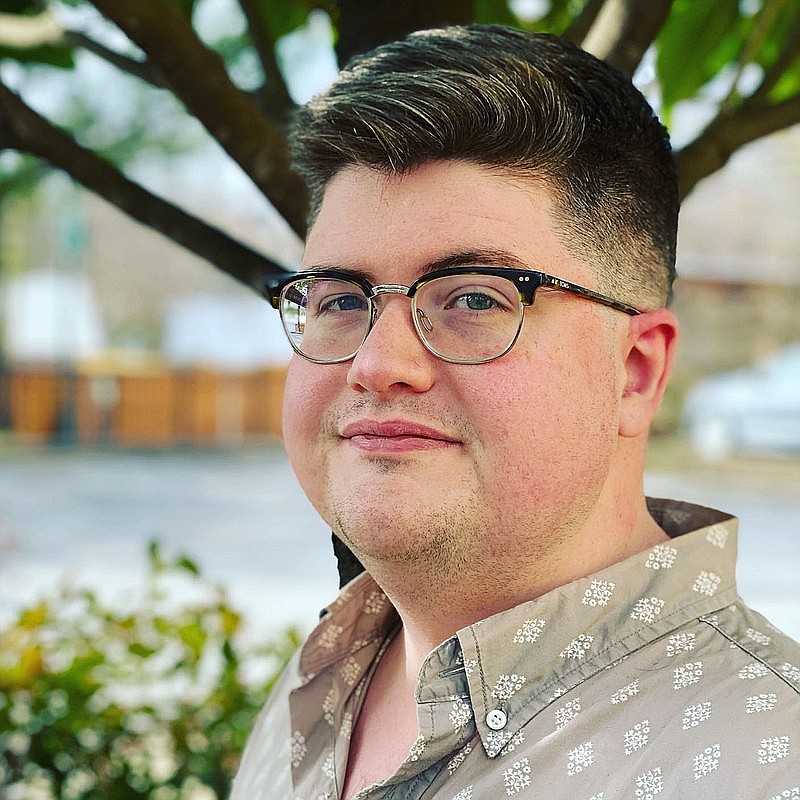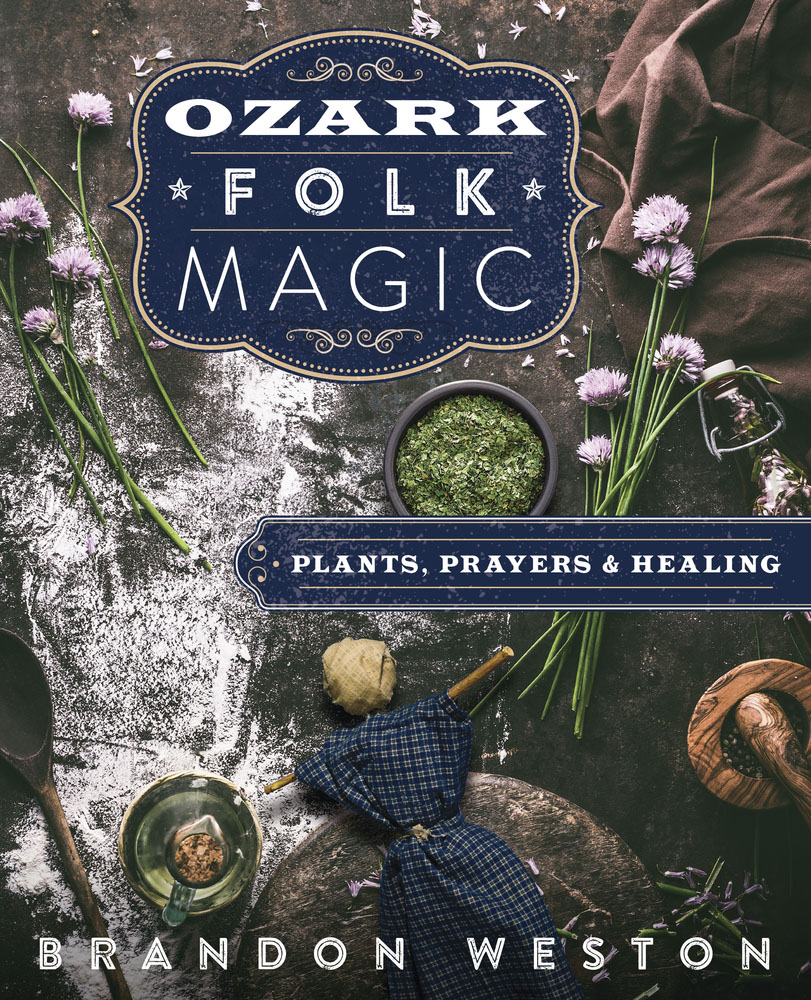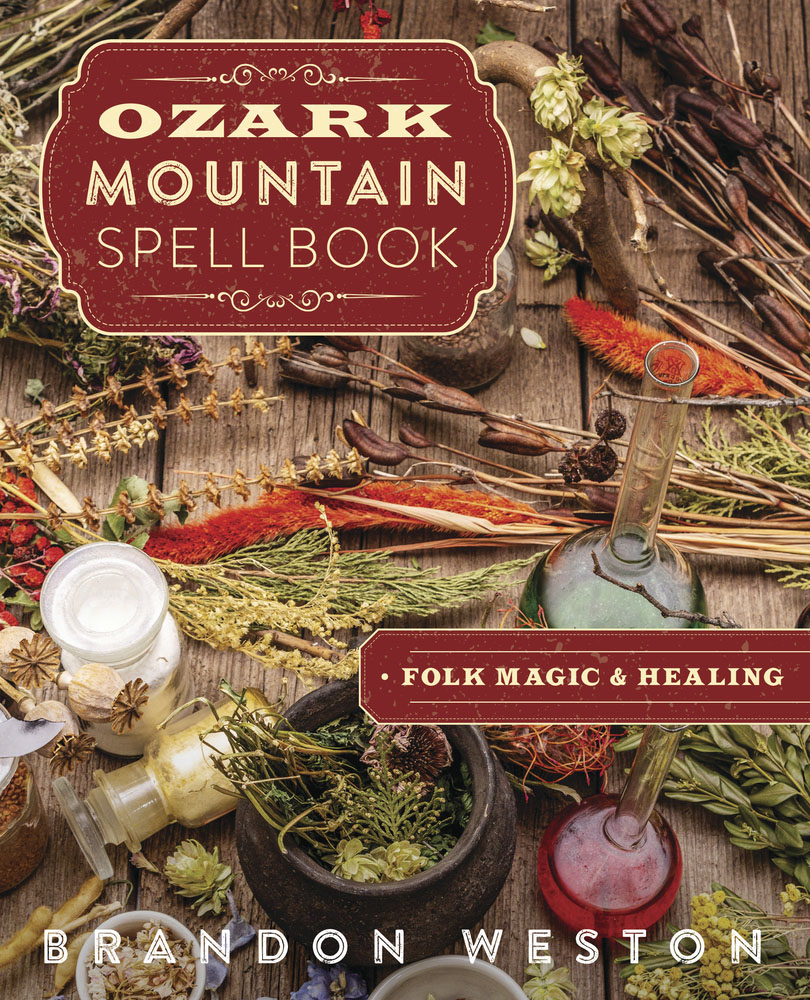Brandon Weston comes from a family of traditional Ozark healers, people who have home remedies to cure any number of things and believe in the power of having bedside company through illness.
Because he grew up surrounded by people like Uncle Bill, who would doctor warts, and other family members who would heal ailments or go see a "witch woman" for a rash, Weston took it as a part of average life and never gave it a second thought. Not until he was attending college, anyway, and realized his experiences were markedly different from his friends who didn't grow up in the area.
Weston explores the traditions and practices of Ozark healers in his two books, "Ozark Folk Magic: Plants, Prayers and Healing" and "Ozark Mountain Spell Book: Folk Magic and Healing."
April Wallace: So just how far back does your family go with their arrival to this area?
Brandon Weston: We have lots of generations here. We go back to a white settlement of Ozark in 1810 or 1820. Before that they were in Tennessee, Georgia, North Carolina -- generally Appalachia. I enjoy genealogy; don't like having unsolved mysteries. We still have a few areas where the records are limited.
AW: In your TedX Fayetteville talk, you mention a moment in which your perspective of your family's abilities changed and you realized that not every family could do what yours did. Can you tell me more about that?
BW: People don't always know (that things like this) are a part of culture until someone from the outside tells them "You do things we don't." I remember that moment of "Wait, other people don't do this?" Because that's just the way it was around an Ozark family.
We've always been a storytelling family; my dad's great uncles and aunt at family reunions would have lots of stories and tall tales. I grew up immersed in Ozark culture as it transformed in the 20th century. Lots of moments defined by (that) type of culture. I talk about remnants from that that have survived with later generations.
My great uncle was a wart charmer; he could heal them.
AW: "Ozark Folk Magic" seems like a unique book. I haven't seen anything else that deals with these topics.
BW: This work is really important. My main goal with writing was to spur conversations and inspire in other Ozarkers to collect their own family practices and community practices, to develop a sense of identity and connect to magical tradition.
Coming from witchcraft and pagan communities, we don't want to culturally appropriate them, we want to connect to ancestral traditions.
One thing I found in the U.S. is that we don't know where we come from. In my family, genealogy traced my family to 15 different countries. How do I connect to that when they came from all across Europe? We provide, first of all, a lost perspective -- from traditional healers in the Ozark mountains.
I wanted to provide stories from teachers I worked with and my own stories. I wanted to provide people, who feel like maybe they have a healing gift, with a foundational reference guide and practices to engage with. I went back and forth with whether I wanted to provide it because Ozark folk practices have been secretive. There's still a lot I will never publish.
Everything I have published has been openly taught to me, and I feel like everyone will benefit from.
AW: How did you come to understand that Ozark culture existed and that it was different from other cultures?
BW: I didn't know anything about this stuff until I got to college and found Vance Randolph, a folklorist of the Civil War era who wrote about the Ozarks. Reading that, something clicked. It was exactly the stuff I had seen from my family.
From there, I devoured everything I could find, but there's very little on the Ozarks out there. Historically speaking, we're getting better on Ozark history, but there's not a lot on folklore. Most was talking about the turn of 20th century, but I wondered, 'Where are we today? Are there modern practitioners of traditions?'
I started doing tours, just going around talking to people and learning what I could. I started working with healers, teachers and small communities and identified with "the gift," the inborn power of healing. My work sort of switched from collecting folklore to things I could use.
I consider myself a traditional healer and practitioner. Not only was I writing folklore but (I conduct treatment). There's nothing from the perspective of practitioners. All the previous writings were from outsiders and from storytellers.
AW: How have healing practices changed in recent years?
BW: Modern practitioners are very different from historical ones. The older ones were specialized like my Uncle Bill in warts and the ability to stop blood in a wound. As healers have died off and as they have not been able to pass down practices, it's started to condense.
Neo-traditional practitioners fill in gaps with other things we learn. We tend to work in more general terms, like a magical consultant more than anything. The people I work with, I pride myself on being able to help them no matter what the issue is by connecting to the healing process, whether it's bad luck, bad relationships, these are things that in the old days would lend itself to healing as well. Folks would connect to the process and develop specific rituals for them.
AW: So modern healers have to know a lot about a lot of areas, then.
BW: The work I do covers pretty much everything, which is hard sometimes, but I find it very rewarding to do as well. It would be easy to specialize. I see myself as providing another side of the healing process. I urge people to seek medical help when needed and generally I get a lot of medical requests. If it doesn't work for them first, I provide the mental, spiritual and magical part of the healing process that our ancestors would have had alongside the healing of the body. Healers pick up where modern medicine drops people.
AW: What does that combination of modern healing and modern medicine look like?
BW: I have clients specifically request healing or praying, such as to bless medicine so that it will work the way it's intended. I develop rituals for people who are sick or in the hospital. I see myself as a bit of a folk psychologist and help provide a connection to their spirit process.
I'm a trained herbalist, but I work more with the mental and spiritual than with medicine. That doesn't mean I don't work with plants, it's still an important part of practice, but for me there are things to be careful of operating in the modern world. There's a lot that we have to deal with that ancestors didn't.
AW: Such as?
BW: We had a workshop that emphasized that (any given) person is probably on a prescription medication, which can react with herbal remedies. It's more important that they seek proper medical treatment. But we like to be there if person wants to connect to healing process in different way.
In the old Ozarks, there wouldn't have been a separation. Both medicine and healers would stay in the home of patient watching over them, a (true, physical) bedside manner. Now we approach this in a different way (with a separation of medical, mental and spiritual health practices). In the Ted talk I gave, I describe this work as an important part of Indigenous cultures. A system in Alaska that has tribal nations working with health professionals at hospitals found that having cultural representatives in the hospital led to people recovering quicker when they have proper medical care as well as culturally specific processes to make them feel comfortable in the process.
That's what I do, too.
AW: Can you give me an example of your practice?
BW: There's a little stereotype that everything (healing-wise seems) so simple. Healers I worked with, you might not know they're doing anything. Some just sit in a chair quietly. Or the more traditional may hold the Bible or have someone hold it. Some do passes, taking their hand over someone.
But the surprising thing for me is this idea that outward simplicity doesn't always mean internal. There's a lot going on.
There are lengthy prayers to recite from memory. There's a fear that if you speak it aloud to certain people or write it down, it will go away. The things I published aren't those.
One of my teachers who (helped) find the gift within me, was on me about asking too many questions. She said as a healer, we should be able to do everything we need to do in a completely empty jail cell. One of those foundational lines about the Ozark practice is the idea that at the end of the day, all of this is about inborn connection, to my own (ability) do what you need to do, whether you have correct plants or ritual objects or setting or correct timing.


